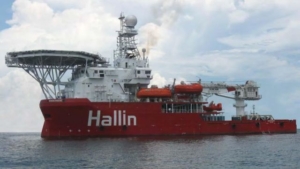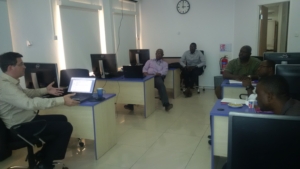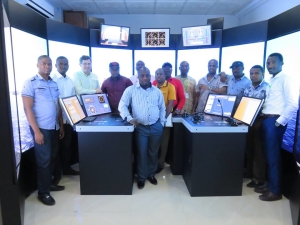Dynamic positioning (DP) is a computer-controlled system to automatically maintain a vessel‘s position and heading by using its own propellers and thrusters. Position reference sensors, combined with wind sensors, motion sensors andgyrocompasses, provide information to the computer pertaining to the vessel’s position and the magnitude and direction of environmental forces affecting its position. Examples of vessel types that employ DP include, but are not limited to, ships and semi-submersible mobile offshore drilling units (MODU), oceanographic research vessels and cruise ships.
using its own propellers and thrusters. Position reference sensors, combined with wind sensors, motion sensors andgyrocompasses, provide information to the computer pertaining to the vessel’s position and the magnitude and direction of environmental forces affecting its position. Examples of vessel types that employ DP include, but are not limited to, ships and semi-submersible mobile offshore drilling units (MODU), oceanographic research vessels and cruise ships.
The computer program contains a mathematical model of the vessel that includes information pertaining to the wind and current drag of the vessel and the location of the thrusters. This knowledge, combined with the sensor information, allows the computer to calculate the required steering angle and thruster output for each thruster. This allows operations at sea where mooring or anchoring is not feasible due to deep water, congestion on the sea bottom (pipelines, templates) or other problems.
Dynamic positioning may either be absolute in that the position is locked to a fixed point over the bottom, or relative to a moving object like another ship or an underwater vehicle. One may also position the ship at a favorable angle towards wind, waves and current, called weathervaning.
D.P OPERATOR
The DP operator (DPO) judges whether there is enough redundancy available at any given moment of the operation. IMO issued MSC/Circ.738 (Guidelines for dynamic positioning system (DP) operator training) on 24-06-1996. This refers to IMCA (International Marine Contractors Association) M 117 as acceptable standard.
NEED TO BECOME A D.P OPERATOR?
I.M.O. have produced the guidelines “Training of Key DP Personnel” in which details are to be found relating to the training and competence of all personnel who have a critical role to play on board DP-capable vessels.
Responsibility for the training, qualification and certification of DP Operators rests with the Nautical Institute. They are the recognized body with the responsibility of issuing DP Operator certificates to suitably trained and experienced personnel. Although the Nautical Institute is UK based, it is very much an international body, and is recognized worldwide as the professional organization responsible for such matters. The Nautical Institute scheme of training follows the recommendations contained in the I.M.O. and I.M.C.A. guidelines.
Nautical Institute Training Scheme for DP Operators
1) The first requirement that will ever get you qualified for a D.P training as a Nigerian is your Certificate of Competence (CoC) which is obtained as a Cadet graduate. This can be obtained from “Maritime Academy of Nigeria, Oron”
2) Shore-based DP Induction(Also know as D.P Basic) course. Intended for officers with little or no DP experience but with a CoC. Duration is 5days. Note: D.P logbook is usually given at the end of this course to capture your sea-time.
3) Obtain a 60days sea-time/sea experience on a D.P vessel. This is usually recorded on your DP logbook
4) Return back to Training and undergo a Shore-based DP Simulator (Also known as D.P Advanced)course. Intended for officers completing phases 1 and 2 above. Duration is 5days.
5) You are required to undergo another 60days of supervised watchkeeping and DP operations on a D.P1 or D.P2 vessel. This must also be recorded on your logbook.
6) Finally, the master onboard the D.P vessel upon which you have undergone the seat-time training needs to verify and stamp your logbook. You will then submit the logbook and your credentials to the Nautical Institute and your D.P Operator’s license will be issued.
How To Undergo D.P Training While in Nigeria
The Nautical Institute(N.I). approved PEM Offshore Simulation and Innovation Centre (POSAIC) as a Dynamic Position (DP) trai ning center following the N.I audit which was conducted early 2015. This is indeed a great news for all seafarers within Nigeria and Africa at large.
ning center following the N.I audit which was conducted early 2015. This is indeed a great news for all seafarers within Nigeria and Africa at large.
With the daily decreasing value of Naira to other Foreign currencies, it has become difficult for Nigerian Seafarers to travel out, let alone pay for the high school fees needed to obtain their D.P licenses. This alone has made the Nigerian N.I approved D.P institute outstanding. In addition, the school has in recent time drastically reduced her course fees by over 40% to the benefit of the Nigerian seafarers, making the school an institution with the most affordable place to obtain your D.P license.
POSAIC has also in addition been accredited by DNV-GL and ABS to offer other courses like Basic and Advanced ASD, Basic Ship Handling, Maritime Resource Management, ECDIS and Bridge Resource Management. With her world class equipment from KONGSBERG, POSAIC is now fully ready to welcome seafarers from Nigeria, Africa and the whole world to the simulation center.
Visit: http s://posaic-ng.com/ for details
s://posaic-ng.com/ for details
Written By: Lucky M
